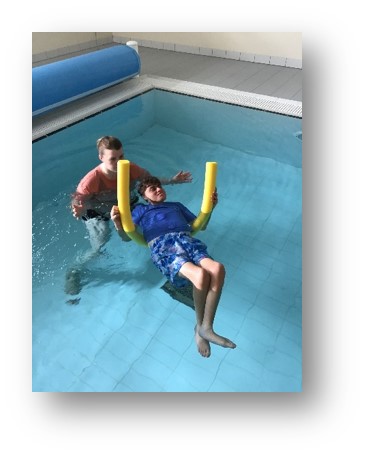.jpg) Overview
Overview
Our Physical Education curriculum is based on the national curriculum and adapted to meet the needs of our pupils. The aim of our PE curriculum is to provide our students with physical literacy and allow them to experience activities they might otherwise not be able to enjoy. We strive to remove barriers to participation, enjoyment and physical self-improvement. Physical literacy is defined by the International Physical Literacy Association as “the motivation, confidence, physical competence, knowledge and understanding to value and take responsibility for engagement in physical activities for life”. We want all students to have the skills and understanding needed to continue enjoying physical experiences into their adult lives, regardless of personal barriers or starting points.
Physical education within our school takes into account individual student and class specific needs with a bespoke approach. We have a range of facilities and equipment to increase participation and inclusion for all students. Our provision ranges from developing fundamental motor skills and body awareness to being a successful team player and competing in sporting events. All of our activities aim to foster an understanding of health and fitness, to build confidence, develop independence and provide enjoyment. We also promote the importance of social skills and community participation for our students, increasing engagement through the promotion of physical literacy.
Where appropriate we sequence learning, for example teaching basic ball skills before putting these skills into a game. All students have access to a range of interventions. These allow for students to have opportunities to build on skills, increase engagement and provide a individualised access to physical literacy on a 1 to 1 or small group basis. Students also have access to our well furnished school gym to build core strength, fitness and mobility and to develop life skills.
British values are at the core of our physical education curriculum. Democracy, the rule of law, tolerance, individual liberty and mutual respect are supported through a range of activities by participation, following game rules, competition, and personal and shared achievements.
Swimming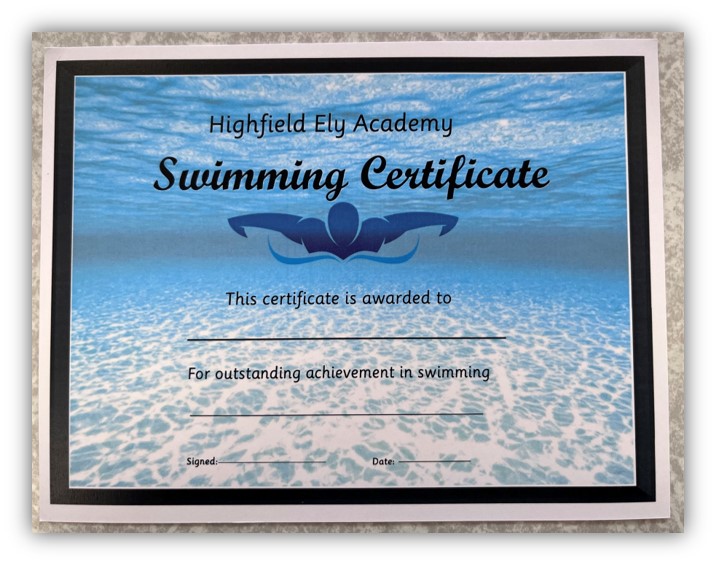
Our whole school swimming scheme is taught to all students not accessing hydrotherapy sessions. The scheme is accessed by students across all Pathways and ages, including young adults at LINC.
The swimming scheme is a sequential progression based on skills taught in the Swim England "Learn to Swim" programme, adapted appropriately for our learners. The skills taught are the same across the Pathways, however, individual support can be adapted as needed (e.g. with or without a floatation device). Progress is tracked against each level and once a student has completed all 6 parts of a level they receive a certificate of achievement. We also use these certificates to track additional data, which can be used to award child specific achievements (e.g. getting in the pool for the first time) and distance awards (e.g. swimming a certain number of lengths over a half term). We also have an additional year 6 assessment which is a statutory level that we assess our year 6's against.
Swimming Progress Plan
PE Annual Plan
Progression
We promote physical literacy through students' everyday routines as well as being taught in bespoke lessons. We provide activities linked to the national curriculum PE areas, including athletics, health and fitness, dance, gymnastics and outdoor and adventurous activities.
In the Blue Pathway, students access physical literacy through group activities, music and movement, parachute games, swimming, body awareness and through use of specialist rooms such as soft play. Students also access this through more individualised approaches such as Rebound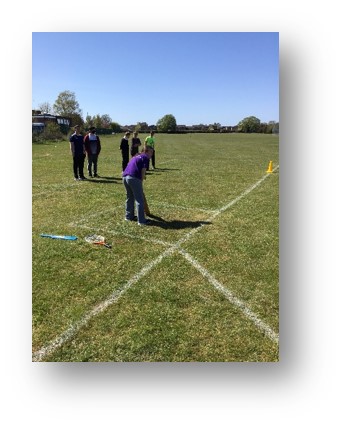 therapy, hydrotherapy, movement breaks, physio programmes, position changes, personal care, and personal equipment such as standing frames. These are individualised for each student’s needs and delivered in a multisensory way. This individualised approach aims to develop independence, core strength, mobility, movement skills, confidence, understanding and body awareness.
therapy, hydrotherapy, movement breaks, physio programmes, position changes, personal care, and personal equipment such as standing frames. These are individualised for each student’s needs and delivered in a multisensory way. This individualised approach aims to develop independence, core strength, mobility, movement skills, confidence, understanding and body awareness.
In the Green Pathway, pupils are taught a multitude of skills and physical movements through a more structured approach alongside self-directed play. Where appropriate, we teach through topics in a thematic approach, e.g. story based dances. We also teach through gross motor skill activities, simple gymnastics skills, dance, early games skills, multisensory activities, and structured and self-directed active play. As a result, students will develop their gross motor skills and generalise these to a range of contexts. This aims to develop confidence in their bodies and movements, teamwork, social relationships, early games skills, listening and coordination.
In the Yellow Pathway, students access PE lessons as well as physical literacy through other activities. PE lessons include a variety of sports focusing on fundamental skills, game rules, coordination and gross motor skills, teamwork and being a team player. Other activities include weekly sports clubs, sports trips, the daily mile, movement breaks and outside break times. Our Yellow Pathway curriculum aims to develop coordination, teamwork, social relationships, understanding of rules and games, understanding game tactics, promoting health and fitness, gross and fine motor skill development, independence and the importance of continued physical activity.
Our Blue Pathway students access physical literacy throughout most of their sessions across the whole school day. This may include being hoisted, freedom to make different movements, accessing inventions including hydro or rebound and through focused sensory based sessions such as music and movement.
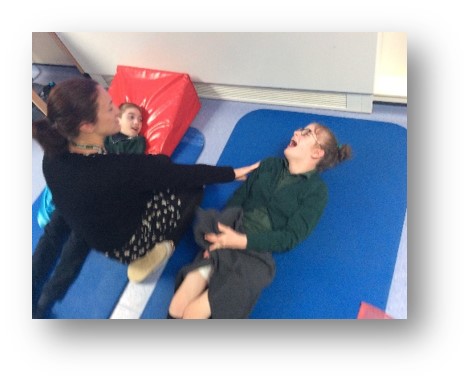
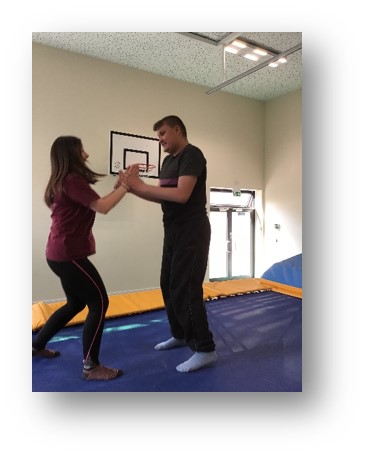
Examples of these include:
- Structured sessions including music and movement, parachute games and action songs These sessions include core strength, fine and gross motor skills and experiencing big body movements either assisted or independently
- Interventions and therapies including individualised Rebound Therapy, Hydrotherapy, Swimming, Yoga and Physio programmes
-
Movement and physical activity in every day routines, e.g. through position changes, hoisting and exploratory play
In the Green Pathway, Physical Literacy is often but not exclusively taught through a thematic approach that relates to topics and books pupils are studying. Similar to the Blue Pathway, not all areas are covered due to the nature of the students’ needs but classes cover a broad range of areas based on their pupil’s needs. Some of the skills our Green Pathway students learn may include:
-
Fundamental movements. Students will learn fundamental skills and develop their gross motor skills. Including running with accuracy, jumping, climbing, skipping and ball skills
-
Gymnastics and Dance. Students developing their gross motor skills to using in different ways. Including travelling in different ways, balance, co-ordination, copying and sequencing basic routines and moving to music
-
Game Skills. Students learning how to participate in group games: following rules, leadership, accepting winning and losing and being a team player
-
Generalisation. Students generalising using their gross motor skills in soft play or on the playground
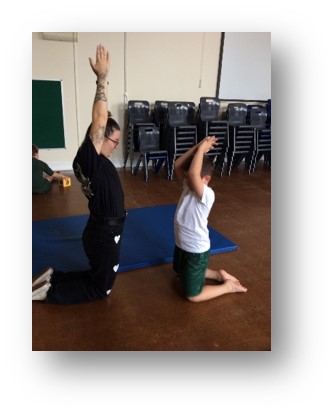

Our Yellow Pathway PE lessons look similar to those in a mainstream setting. Students get the opportunity to choose from a range of options each half term. There is also a weekly Sports Club on Friday afternoons that students can opt in to. Additionally, a range of extra-curricular activities run throughout the school year, some of which are run with help from our senior Sports Leaders.
-
Weekly PE Lessons: ball/game skills, developing sport specific gross motor skills, game rules, teamwork, winning and losing gracefully, hand/eye co-ordination and gross motor skills
-
Sports based lessons. Including learning about individual sports' rules and tactics such as football, rugby, basketball, hockey, swimming
-
Healthy living. Students learn about healthy lifestyles and how to keep fit. This includes healthy eating, using exercise to promote mental wellbeing
-
How to keep our bodies fit and strong
.jpg)
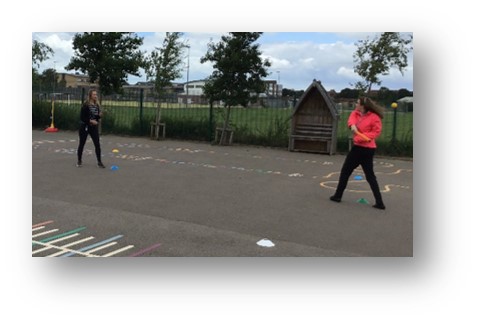
Impact
We know from conversations with staff, pupils (past and present), parents and carers, annual reviews and lesson observations that the impact physical education has for pupils in our school is:
- Pupils develop their teamwork and communication skills
- Students become more confident in their physical, communication and people skills
- Pupils develop both their cardiovascular and physical strength, which allows them to have a healthier body and lifestyle
- Pupils become excited about accessing sport within their communities
- Learners learn to cope with and improve through experiencing failure during a range of games and activities


